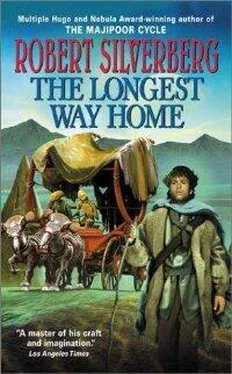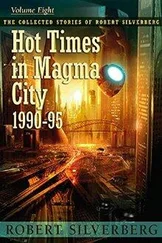Several times on his better days he approached men in the enclosure to ask them why they were here, who their captors were, what was the current state of the civil war. Each time they turned coldly away from him as though he had made an obscene proposal. No one ever spoke to anyone in this compound. He called out to the three Indigenes that he was a friend of the Ardardin and had worked as a doctor among the people of the mountains, but they too ignored him, and one day they were removed from the enclosure and he never saw them again.
I will die in this place, he thought.
It is an absurd end to my journey. It makes no sense. But what can I do? Confess that I’m a spy? I am not a spy. I could give them no useful information about my spying even if I wanted to.
I suppose that I can confess that I am a Master, Joseph thought, and then they can take me out and shoot me, and that will be the end. But not yet. I am not quite ready for that. Not yet. Not yet.
Then one morning a guard came for him, very likely the same one who had come for him that other time, and gave him the same wordless gesture of beckoning as before, and led him up the long aisle of important-looking structures to the office of the burly man with thinning reddish-gold hair who had interrogated him earlier. This time the man’s desk was bare. Joseph wondered what had become of his possessions. But that probably did not matter, he thought, because this time they would ask him the fatal questions, and then they would kill him.
The officer said, “Is your name Joseph Master Kilran?”
Joseph stared. He could not speak.
“Is it? You may as well say yes. We know that you are Joseph Master Kilran.”
Joseph shook his head dazedly, not so much to deny the truth, or almost-truth, of what the man was saying, but only because he did not know how to react.
“You are. Why hide it?”
“Are you going to shoot me now?”
“Why would I shoot you? I want you to answer my question, that’s all. Are you Joseph Master Kilran? Yes or no.”
It would be easy enough to answer “No” with a straight face, since he was in fact not Joseph Master Kilran. But there could be no doubt that they were on to the truth about him, and Joseph saw no advantage in playing such games with them.
He wondered how they had found him out. Were descriptions posted somewhere of all the missing Masters, those who had escaped being slain when the Great Houses of Manza were destroyed? That was hard to believe. But then he understood. “Kilran” was his clue: Thayle had never managed to pronounce his surname accurately. This man must have recognized all along that he was a Master. Probably in the past few days they had sent messengers to the people of all the towns in the vicinity, including the people of Eysar Haven, asking them whether any fugitive Masters had happened to come their way lately. And so they had learned his name, or something approximating his name, from Thayle. It was a disquieting thought. Thayle would never have betrayed him, he was sure of that: but he could easily picture Grovin betraying her , and Governor Stappin forcing a confession out of her, by violent means if necessary.
It was all over now, in any case.
“Keilloran,” Joseph said.
“What?”
“Keilloran. My name. ‘Kilran’ is incorrect. I am Joseph Master Keilloran, of Keilloran House in Helikis.”
The officer handed Joseph a writing-tablet. “Here. Put it down on this.”
Joseph wrote the words down for him. The officer stared at what Joseph had written for a long moment, pronouncing the words with his lips alone, not uttering any of it aloud.
“Where is House Keilloran?” he asked, finally.
“In the southern part of central Helikis.”
“And what was a Master from the southern part of central Helikis doing in High Manza?”
“I was a guest at Getfen House. The Getfens are distant kinsmen of mine. Were .”
“After Getfen House was destroyed, then, what did you do, where did you go?”
Joseph told him, a quick, concise summary, the flight into the forest, the aid that the noctambulo had given him, the sojourn as a healer among the Indigenes. He did not care whether the officer believed him or not. He told of his escape in the mountains, of his trek back to the lowlands and his time of starvation, of his rescue by the inhabitants of a friendly cuyling town. He did not name the town and the officer did not ask him for it. “Then I left them and was heading south again, still hoping to find my way back to Helikis, when I was captured by your men,” Joseph concluded. “That’s the whole story.”
The officer, tugging obsessively at the receding curls of his forehead, listened with an apparent show of interest to all that Joseph had to say, frowning most of the time. He took extensive notes. When Joseph fell silent he looked up and said, “You tell me that you are a visitor from a far-off land who happened by accident to be in Manza at the time of the outbreak of the Liberation.” It was impossible for Joseph not to hear the capital letter on that last word. “But why should I accept this as true?” the man asked. “What if you are actually a surviving member of one of the Great Houses of Manza, a spy for your people, lying to me about your place of origin? One would expect a spy to lie.”
“If I’m from one of the Great Houses of Manza, tell me which one,” said Joseph. He had started speaking in Master, without giving it a thought. “And if I’m a spy, what kind of spying have I been doing? What have I seen, except some Indigene villages, and one town of free Folk who were never involved in your Liberation at all? Where’s the evidence of my spy activities?” Joseph pointed to the officer’s desk, where his belongings once had lain. “You confiscated my pack, and I assume you’ve looked through it. Did you find the notes of a spy in it? My records of troop movements and secret strategic plans? You found my school textbooks, I think. And some things I wrote down about the philosophical beliefs of the Indigenes. Nothing incriminating, was there? Was there?”
The officer was gaping at him, big-eyed. Joseph realized that he was swaying and about to fall. In his weakened condition an outburst like this was a great effort for him. At the last moment he caught hold of the front of the officer’s desk and clung to it, head downward, his entire body shaking.
“Are you ill?” the officer asked.
“Probably. I’ve been living on your prison-camp food for I don’t know how many days. Before that I was foraging for whatever I could find in the wilderness. It’s a miracle I’m still able to stand on my own feet.” Joseph forced himself to look up. His eyes met the officer’s. —”Prove to me that I’m a spy,” he said. “Tell me which House I come from in Manza. And then you can take me out and shoot me, I suppose. But show me your proof, first.”
The officer was slow to reply. He tugged at his hair, chewed his lower lip. Finally he said, “I will have to discuss this with my superiors.” And, to the guard who had brought him here: “Return him to the compound.”
Shortly past midday, before Joseph had even had a chance to confront whatever unsavory stuff they intended to give the prisoners for their afternoon meal, he was back at the big officer’s headquarters again. Two other men in officers’ uniform, senior ones, from the looks of them, were there also.
One, a hard-looking man who had a terrible scar, long healed but still vivid, running across his jutting cheekbone and down to the corner of his mouth, pushed a sheet of paper toward Joseph and said, speaking in Master, “Draw me a map of Helikis. Mark the place where you come from on it.”
Joseph made a quick sketch of the continent, and drew a cross a little past midway down to indicate the location of Keilloran House.
Читать дальше












